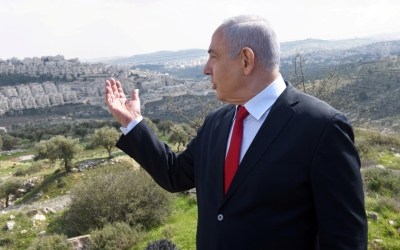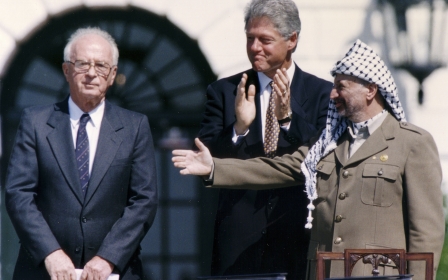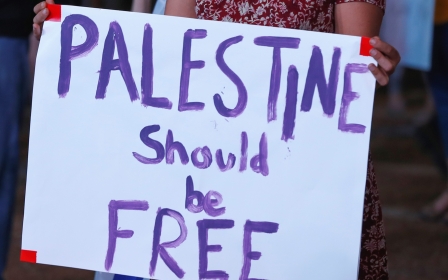Israeli annexation would cement existing reality of one-state 'apartheid'

Israel's looming annexation of parts of the West Bank will formalise an existing reality for Palestinians who have been living under Israeli occupation and control since 1967 as subjects without basic political rights.
But the expected declaration applying Israeli sovereignty to parts of the Palestinian territories would still be a major turning point in the conflict. Annexation would be a grave violation of international law enabling further abuses against Palestinians, experts say.
"I get that the facts on the grounds have been such that this has been the reality for the Palestinian people, but this is an extraordinary measure and should not be minimised in any way," said Maya Berry, executive director of the Arab American Institute (AAI), a Washington-based think-tank.
A 1 July deadline that the Israeli government had set for starting the process of annexation passed on Wednesday without any announcement, as Prime Minister Benjamin Netanyahu said his government was still in "discussions" of the issue.
Legal scholars and human rights advocates have been sounding the alarm over the move, warning that it would further entrench the status quo of Israeli abuse against Palestinians.
New MEE newsletter: Jerusalem Dispatch
Sign up to get the latest insights and analysis on Israel-Palestine, alongside Turkey Unpacked and other MEE newsletters
That status quo has been in the making for decades, as Israel has gradually taken steps to diminish Palestinians' chances of achieving equality and self-determination.
'Killing the two-state solution'
Israel captured the Gaza Strip and the West Bank, including East Jerusalem along with Syria's Golan Heights, in the 1967 war. In 1980 it claimed sovereignty over East Jerusalem, and the Golan a year later.
And while the international community did not recognise Israel's claims over these territories, not much was done to penalise the Israeli government for violating the basic tenet of international law against acquiring territory by force.
'This is an extraordinary measure and should not be minimised in any way'
- Maya Berry, AAI
In 2018, Israel passed its nation-state law declaring that the "exercise of the right to national self-determination in the State of Israel is unique to the Jewish People."
"Israeli policy has been killing the two-state solution slowly and gradually over the past few decades," Berry told MEE.
She said in the past, she refrained from using the term "apartheid" to describe the situation in Israel/Palestine, to keep conversations open. "After the passage of the nation-state law, there's really no other word that adequately describes the situation."
Berry added that she thought the 2018 law would garner greater opposition in Washington and across the world. In reality, it passed with no consequences for the Israeli government, much like the incorporation moves of 1980 and 1981, the separation wall of the early 2000s and ongoing settlement growth in the West Bank.
"That's my concern with annexation now," Berry said. "There are some who are saying: Look, in practice, this is what's been happening, so go ahead and formalise it, and that way we'll come to terms with the reality that exists. The problem is that in the past, there hasn't been a political price to pay when this happens, and I think that's what has to be different this time around."
'In this one-state reality, there's one power - the government of the State of Israel that controls everyone and everything between the River and the Sea'
- Hagai El-Ad, B'Tselem
On Tuesday, 13 US lawmakers sent a letter to Secretary of State Mike Pompeo calling for imposing conditions on Washington's military aid to Israel if it proceeds with annexation.
Still, that's only 13 legislators among 535 in the House of Representatives and the Senate. The administration of President Donald Trump appears to be on board with Israel's plans, while most Democrats, including presidential candidate Joe Biden have only issued verbal condemnations of the move, without vowing to take any meaningful action to stop it.
In mid-June, 50 UN human rights experts issued a statement calling for action against Israeli violations.
"States have a duty not to recognise, aid or assist another state in any form of illegal activity, such as annexation or the creation of civilian settlements in occupied territory," they said.
"The lessons from the past are clear: Criticism without consequences will neither forestall annexation nor end the occupation."
'Different shades of oppression'
Hagai El-Ad, executive director of B'Tselem, a leading Israeli human rights group, said while many in the international community are openly saying that Israel's annexation plans merit consequences, this line of thinking should apply to the current situation as well.
"I want to believe that even if de jure annexation does not go ahead, the principle won't be folded back, that everyone will keep on to that understanding," he told MEE.
El-Ad said Israel has de-facto control over the land between the Mediterranean Sea and the Jordan River, whether formal annexation proceeds or not.
"We live in a one-state reality. And in this one-state reality, there's one power - the government of the State of Israel that controls everyone and everything between the River and the Sea," El-Ad told MEE.
"This reality is inherently undemocratic because in it, it has millions of people who have no political rights - all of them Palestinians."
Despite that "brutal" situation that has "aspects of apartheid embedded in it", El-Ad added, Israel seeks to promote itself as a smoothly functioning democracy awaiting a final status agreement in the West Bank and East Jerusalem.
In addition to its military occupation, Israel began to build settlements in the Palestinian territories it captured in the 1967 war. The policy of settlement-building has been pursued by successive Israeli governments of different ideological leanings, all in clear violation of international law.
"The Occupying Power shall not deport or transfer parts of its own civilian population into the territory it occupies," Article 49 of the Fourth Geneva Convention states.
Today, about 600,000 Israeli settlers live in the West Bank and enjoy the full political and legal rights of Israelis living within the internationally recognised borders of the state of Israel.
"If you're Jewish, it doesn't matter where you live between the River and the Sea. The state takes care of everything… you have your one shade of privilege," El-Ad said.
While for Palestinians, he noted, "there are different shades of oppression", depending on where they live.
They can be besieged in Gaza, under Israeli occupation in the West Bank, have residency status in East Jerusalem or live as citizens who face discrimination in pre-1967 Israel.
Those facts exist and need to be addressed with or without a declaration of annexation by the Israeli government, El-Ad said.
What annexation will do, he said, is make it more difficult "to continue holding on to the fantasy" that the occupation is temporary.
One 'apartheid' state
Beyond the implications of international law and the prospects of a two-state solution, Palestinian rights advocates worry that annexation would provide more legal avenues for Israel to confiscate Palestinian land, increase home demolitions and enable settler violence in the West Bank.
"Annexation, while on the one hand is a legal and nominal formalisation of a system that already exists, we shouldn't ignore the fact that it also is going to mean immediate worsening harm for Palestinians living in the West Bank," said Beth Miller, government affairs manager at JVP Action, a political advocacy group linked to Jewish Voice for Peace.
She added that it would cement the reality of "apartheid" with a "very clear system of governance in which people are granted more or less rights based on ethnicity or nationality".
That "apartheid" is what is emerging with the gradual death of the two-state solution, not the one binational state with equal rights that some Palestinian rights advocates call for.
Palestinian-American analyst Omar Baddar said there is nothing to celebrate about the fading chances of a viable Palestinian state with annexation.
"Israel's permanent apartheid vision, driven by a policy of gradual ethnic cleansing to confine Palestinians to tiny, isolated areas, continues to be carried out and cemented on the ground regardless of whether Palestinians are demanding equal rights in a single state or independence in a separate Palestinian state," Baddar told MEE.
"The extent of illegal Israeli settlement expansion does indeed obstruct the prospect of Palestinian freedom in the occupied territories, but the prospect of Palestinian freedom in all of historic Palestine" is equally difficult.
Middle East Eye delivers independent and unrivalled coverage and analysis of the Middle East, North Africa and beyond. To learn more about republishing this content and the associated fees, please fill out this form. More about MEE can be found here.






